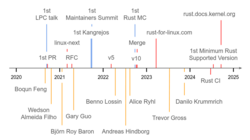LWN on Linux and Rust
-
LWN ☛ Improved load-time checking for BPF kfuncs
The BPF verifier is charged with the challenging task of ensuring that a BPF program is safe for the kernel to run before that program is loaded. Among many other concerns, the verifier must ensure that any kfuncs (kernel functions that have been exported to BPF programs) are called with the correct parameters and from the right context. The "context" part of that enforcement is showing its age in ways that are hurting performance; Juntong Deng has been working on infrastructure to provide finer-grained control over when a kfunc can be called.
Every BPF program is assigned a specific type; the full list of types can be found in Documentation/bpf/libbpf/program_types.rst. So, for example, BPF_PROG_TYPE_FLOW_DISSECTOR is for programs that implement network flow dissectors, while BPF_PROG_TYPE_LSM is for programs run from the BPF Linux Security Module. The kernel will not allow a program to be attached to a BPF hook if the program is not of the correct type for that hook. This restriction prevents BPF programs from being invoked from contexts that they are not designed for.
The kernel's kfunc mechanism is a relatively recent addition that allows any function within the kernel to be made available for direct calling from a BPF program. Here, too, it is important that kfuncs are only called from the correct context. So, whenever a set of kfuncs is registered with the BPF subsystem (using a call to register_btf_kfunc_id_set()), the program type must be supplied; the verifier will ensure that only programs of the given type can call a kfunc from that set.
-
LWN ☛ Smarter IRQ suspension in the networking stack
High-performance networking is a highly tuned activity; the amount of time available to deal with each packet may be measured in nanoseconds, so care must be taken to avoid anything that might slow the process down. Recently, there has been a fair amount of attention given to a patch set merged for 6.13 that, it is claimed, can improve processing efficiency (and, thus, power savings) in data centers by as much as 30%. The change itself, contributed by Joe Damato and Martin Karsten, is a relatively small tweak to existing optimization techniques; it shows just how much care is needed to optimize a high-bandwidth server.
In a simple configuration, a network interface will receive a packet, place it in RAM somewhere, then interrupt the CPU to let the kernel know that the packet is ready for processing. That worked well enough when networks were slow, but is decidedly less than optimal in current data centers. Older readers out there will remember a time when every email was special, so we configured our systems to beep (interrupt) at us whenever a message arrived. But that interrupt has a cost, and we do not do that anymore. Instead, we check email occasionally in the sure knowledge that there will be a bountiful supply of new phishing spam waiting for us when we get there.
-
LWN ☛ Maintainer opinions on Rust-for-Linux
Miguel Ojeda gave a keynote at FOSDEM 2025 about the history of the Rust-for-Linux project, and the current attitude of people in the kernel community toward the experiment. Unlike his usual talks, this talk didn't focus so much on the current state of the project, but rather on discussing history and predictions for the future. He ended up presenting quotes from more than 30 people involved in kernel development about what they thought of the project and expected going forward.
-
LWN ☛ Rewriting essential Linux packages in Rust [Ed: That's like outsourcing a lot of GNU to Microsoft through proprietary GitHub and Rust that's also controlled by it]
Most Linux systems depend on a suite of core utilities that the GNU Project started development on decades ago and are, of course, written in C. At FOSDEM 2025, Sylvestre Ledru made the case in his main stage talk that modern systems require safer, more maintainable tools. Over the past few years, Ledru has led the charge of rewriting the GNU Core Utilities (coreutils) in Rust, as the MIT-licensed uutils project. The goal is to offer what he said are more secure, and more performant drop-in replacements for the tools Linux users depend on. At FOSDEM, Ledru announced that the uutils project is setting its sights even higher.
Ledru has been a Debian developer for more than 20 years, and is a contributor to LLVM/Clang as well as other projects. He is a director at Mozilla, but said that the work he would be talking about is unrelated to his day job.
LF steps in (LWN is also LF connected):
-
Linux royalty backs adoption of Rust for kernel code • The Register [iophk: GKH selling out to Microsoft again]

